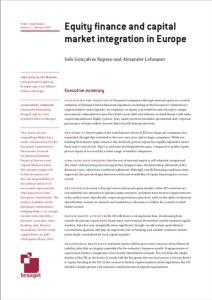Join getAbstract to access the summary!

Join getAbstract to access the summary!
Inês Gonçalves Raposo and Alexander Lehmann
Equity Finance and Capital Market Integration in Europe
Bruegel, 2019
What's inside?
Private equity can play a critical role in capital raising in the euro area.
Recommendation
A deep-rooted bank financing culture still holds in Europe, constraining the development of external sources of capital for businesses. The eventual end of cheap money would seem to open the door to alternatives to bank credit, yet onerous and duplicative regulations hinder private equity’s growth. This scholarly report by researchers Inês Gonçalves Raposo and Alexander Lehmann highlights the gap that remains between financing needs and availability. The authors note that private equity can act as a critical bridge, particularly for smaller companies. This astute analysis offers substantive insights to policy analysts, investors and financial professionals.
Summary
About the Authors
Inês Gonçalves Raposo and Alexander Lehmann are professionals with Bruegel.


















Comment on this summary